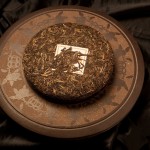Dr. Oz – The Power of Pu-erh

If Pu-erh tea were a child, she would be difficult, brilliant, and misunderstood. Perhaps no other tea elicits such passion; devotees herald its unique taste, its fabled history and its health benefits, while detractors say it tastes like mud, smells of must and looks like dirt. Pu-erh (POO-air) tea was banned from entering the U.S. for fear it might prove harmful due to its off-putting characteristics.
“Chinese herbalists have been prescribing it for thousands of years,” said legendary tea pioneer and Pu-erh expert Roy Fong, owner of the Imperial Tea Court in San Francisco and Berkeley. “We know that it helps with digestion. And there’s a very good reason: If you put hot water to grease, you will start to dissolve grease. Hot Pu-erh tea dissolves grease even better and makes the system work better.” The bacteria growth that comes from the fermentation process, said Fong, is “almost like a probiotic.”
Pu-erh tea has been heralded in controlling weight, lowering “bad” (low-density lipoprotein or LDL) cholesterol, and even shrinking tumors in mice, among other health claims. Media star Dr. Mehmet Oz recently touted its weight-loss virtues, prompting what teashop owner Sally Collura calls “The Dr. Oz effect.”
Collura, who owns the Tea Leaf in Waltham, Mass., said that after Dr. Oz praised Pu-erh, “My phone rang off the hook. but I told my customers that it’s not a magic drink; they need to think about what they’re eating.”
An intriguing Chinese study published in the Chinese Journal of Integrative Medicine in 2011 described Pu-erh’s ability to regulate metabolic syndrome. Affecting an estimated 25% of Americans, metabolic syndrome is characterized by big bellies, elevated blood sugar, abnormal cholesterol and high blood pressure and can lead to type 2 diabetes, stroke and heart disease. In the study, 90 patients with metabolic syndrome were given either Pu-erh extract or a placebo. After 3 months, the Pu-erh group had significant improvements in their HDL, glucose and amount of belly fat compared to the placebo group. Another study from Japan gave overweight men and women either powdered Pu-erh mixed with barley tea or just barley tea. After 12 weeks, the Pu-erh group had lost significantly more weight and belly fat than the group who only drank the barley tea, according to a report in Nutrition Research. At Yunnan Agricultural University, scientists fed rats either a high-fat or normal diet along with varying levels of Pu-erh extract. The fat rats given the Pu-erh tea extracts experienced a significant reduction in body weight compared to the control rats according to the Journal of Phytotherapy Research.
One reason for Pu-erh’s powerful effects may be gallic acid, a natural anti-oxidant that is also an anti-fungal and antiviral agent. The fermentation of Pu-erh elevates the levels of gallic acid, while reducing catechins. In studies reported in Talanta, scientists have found Pu-erh has twice the gallic acid of black tea and four times that of green. But in the final sip, Pu-erh remains alluring and simply delicious, regardless of health claims.
Author: Ava Swartz, Contributor
Source: Tea Magazine
TIDBIT: To read part one of this article and to stay up to date on the latest additions to our store, you can sign up for our Tin Roof Teas newsletter. This can be done through one of our Tea Consultants the next time your in the store or through our Facebook page.

